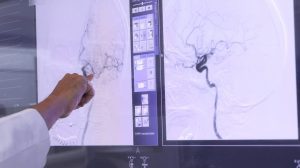NEW YORK (Reuters Health) – Evidence-based guidelines released Monday recommend that women with epilepsy avoid taking the antiepileptic drug (AED) valproate during pregnancy.
"Good evidence shows that valproate is linked to an increased risk for fetal malformations and decreased (cognitive) skills in children, whether used by itself or with other medications," lead guideline author Dr. Cynthia Harden noted in a statement from the American Academy of Neurology.
The guidelines also advise pregnant women with epilepsy and their physicians to consider avoiding the AEDs phenytoin and phenobarbital in order to reduce the risk of poor cognitive outcomes in offspring.
The guidelines, a collaborative effort by the American Academy of Neurology and the American Epilepsy Society, were published April 27 in the journal Neurology and the journal Epilepsia. They were also presented at the American Academy of Neurology’s annual meeting in Seattle on Monday.
In a summary for clinicians, Dr. Harden, director of the epilepsy division at the University of Miami’s Miller School of Medicine, and colleagues point out that "AEDs can prevent seizures during pregnancy, which by extension protects the fetus. For most women with epilepsy, discontinuing AEDs is not a reasonable or safe option."
However, "it seems reasonable to switch women with epilepsy of childbearing potential to a less teratogenic regimen when possible," the authors advise. "Changing from valproate to another AED should be done well before pregnancy," the guideline team notes, adding that switching from valproate several weeks into gestation will not avoid the risk of major malformations.
The clinicians also note that published studies of many AEDs were "too small to make conclusions and the teratogenicity of these drugs is unknown."
The newly released guidelines also suggest that women with epilepsy avoid taking more than one AED at a time during pregnancy, if possible, since polytherapy has also been found to increase the risk of birth defects compared to monotherapy.
Current evidence suggests that pregnancy is safe in women with epilepsy. The authors say they found "no conclusive evidence" of a substantially increased risk of Cesarean section, late pregnancy bleeding, or premature contractions or premature labor and delivery.
"Further, the findings do not suggest high rates of status epilepticus, increased seizure rate, or increased risk of seizure relapse during pregnancy for women with epilepsy who are seizure free," the team reports.
"If a woman is seizure free nine months before she becomes pregnant, it’s likely that she will not have any seizures during the pregnancy," Dr. Harden said. However, because blood levels of AEDs "tend to drop during pregnancy," close monitoring of AED blood levels "should be considered," she added. For the complete guidelines, visit www.aan.com.




